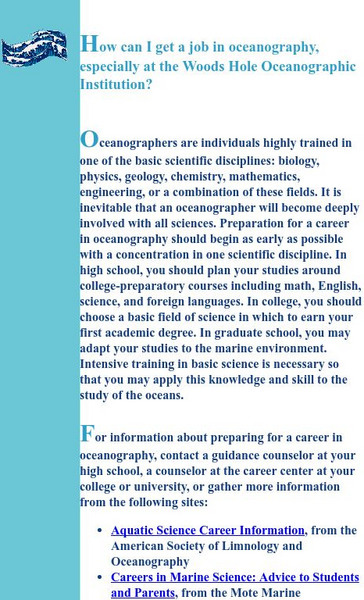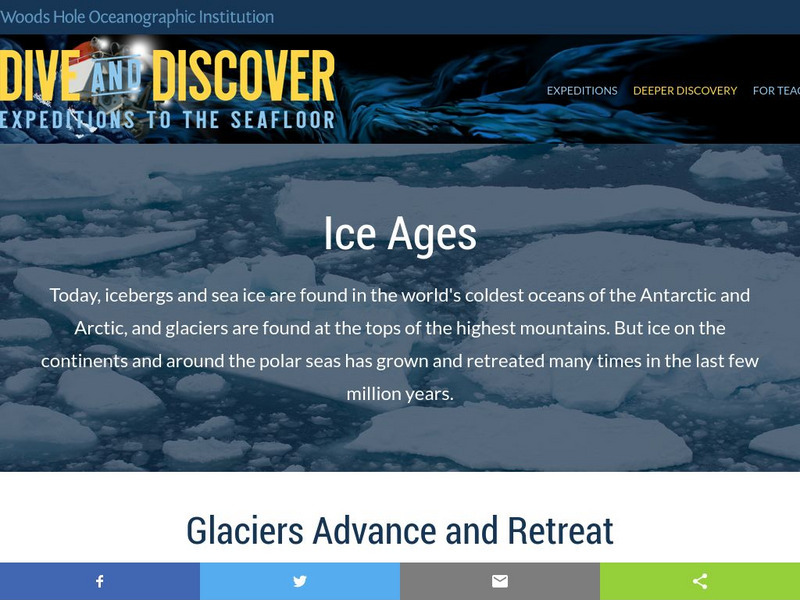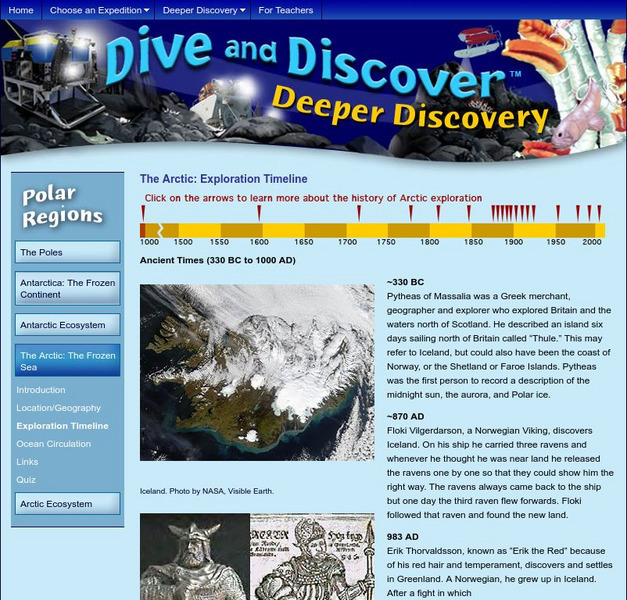Hi, what do you want to do?
Curated OER
the New Explorers:Into the Depths
Learners explore the self preservation mechanism that is inherent in the Great Lakes. They examine how scientists are studying Great Lakes, and what their predictions are for these national treasures.
Curated OER
Sharkland Wiki
Learners, while researching the waters around southern Africa and viewing a video of the episode "Sharkland" from Thirteen's series NATURE, critique reliability of online resources and analyze the various components of a wiki. They...
Curated OER
Estuarine Currents
Students explore an estuarine system to gather data on density driven currents. This type of current is contrasted with temperature and wind driven currents.
Curated OER
Water: On the Surface and in the Ground
Young scholars explore the differences between surface water and ground water. They collect data using maps and graphs and investigate a Texas river basin and a nearby aquifer. They complete a written report including maps and data...
Curated OER
Commonalities and Differences from Africa to Cleveland as Evidence Through the Gullah Community Connection
Students explore Afro-American history. They identify the commonality between African, Carolinian and Cleveland Black culture. Students explore the water cycle, oceanography, hydrology and bio-geochemical processes. They discuss the...
Curated OER
Head to Foot
Learners describe the body form and major anatomical structures of squids and describe some unusual or unique features of newly-discovered deep water squid species. They infer what types of food squids use from their anatomical features.
Curated OER
Remote Sensing
Students study the effects of global warming on specific organisms. They research the possible problems global warming is causing.
Curated OER
Water Layering and Circulation
Students examine relationships and interactions between different types of water. They experiment with colored water of different temperature and salinity and discuss how the results relate to real ocean currents.
Curated OER
GPS Art
Students design their own logo or picture and use a handheld GPS receiver to map it out. They write out a word or graphic on a field or playground, walk the path, and log GPS data. The results display their "art" on their GPS receiver...
Curated OER
What is Biocomplexity?
Young scholars dicuss different aspects of biocomplexity. They demonstrate synthesis of complex concepts by creating before and after posters expressing how the concepts of biocomplexity have ben internalized. Students define the term...
Curated OER
Four Seasons
First graders examine and describe the characteristics of the four seasons. Using a computer, they write one sentence about each of the four seasons and draws an illustration to accompany it. They present each drawing and sentence to the...
Curated OER
Bank On It! Antarctica
In this vocabulary instructional activity, students read an informational paragraph about Antarctica. Students then fill in the 17 blanks with words from the word bank.
The Franklin Institute
Treasures@sea: Exploring the Ocean Through Literature
This extensive resource consists of learning activities that integrate language arts with oceanography. Each activity is based on one of seven books about the ocean and are written to be adaptable. Includes writing activities, games and...
University of Wisconsin
University of Wisconsin: Underwater Exploration Timeline
Use this interactive tool to discover the history and advancements of underwater exploration through time. Follow the timeline from ancient divers to diving suits to scuba diving to submarines, famous people, and more.
Exploratorium
Exploratorium: Webcast: Live Deep Sea Exploration via E/v Nautilus
Oceanographer Dr. Bob Ballard is interviewed in a webcast to highlight the purpose and experiences of his deep sea explorations. Ballard has teams on a ship studying in the Mediterranean Sea and Atlantic Ocean researching hydrothermal...
NOAA
Noaa: Ship Okeanos Explorer: "America's Ship for Ocean Exploration"
Follow teams of scientists as they explore marine life and habitats of the deep ocean. Covers past and current expeditions in various regions of the world. Includes webcasts, videos, lesson plans and modules, and career resources. An...
Woods Hole Oceanographic Institution
Whoi: Oceanography Careers
Do you want to get started in preparing for a career in oceanography? Explore resources to start the career planning process.
TED Talks
Ted: Ted Ed: On Exploring the Oceans
Ocean explorer Robert Ballard takes us on a mindbending trip to hidden worlds underwater, where he and other researchers are finding unexpected life, resources, and even new mountains. He makes a case for serious exploration and mapping....
Woods Hole Oceanographic Institution
Woods Hole Oceanography Institute: Ice Ages: Glaciers Advance and Retreat
Why have we had ice ages in the past? This resource explores the reasons why the earth's climate has repeatedly changed to create ice ages. A quiz is available to check your understanding.
Woods Hole Oceanographic Institution
Woods Hole Oceanography Institute: The Arctic: Exploration Timeline
This interactive timeline traces the history of Arctic exploration from 330BC to 2000AD.
University of South Florida
Project Oceanography: Single Celled Organisms [Pdf]
In this lesson, students explore three kinds of symbiotic relationships involving unicellular organisms. They will also look more closely at the relationship between zooxanthellae and coral, and the importance of nitrogen-fixing bacteria...
Palomar Community College District
Palomar College: Careers in Oceanography
Oceanography is a very competitive career field. Explore the wide range of careers in marine science from Palomar College and how you can begin preparing to secure one of job openings.
American Museum of Natural History
American Museum of Natural History: Oology: Expeditions
This student module includes short, informational text, images, interactive games, and quizzes about ocean exploration.
Woods Hole Oceanographic Institution
Woods Hole Oceanography Institute: History of Oceanography
An interactive timeline will guide you through the history of oceanography. The timeline stretches from 30,000 BCE to the present.























